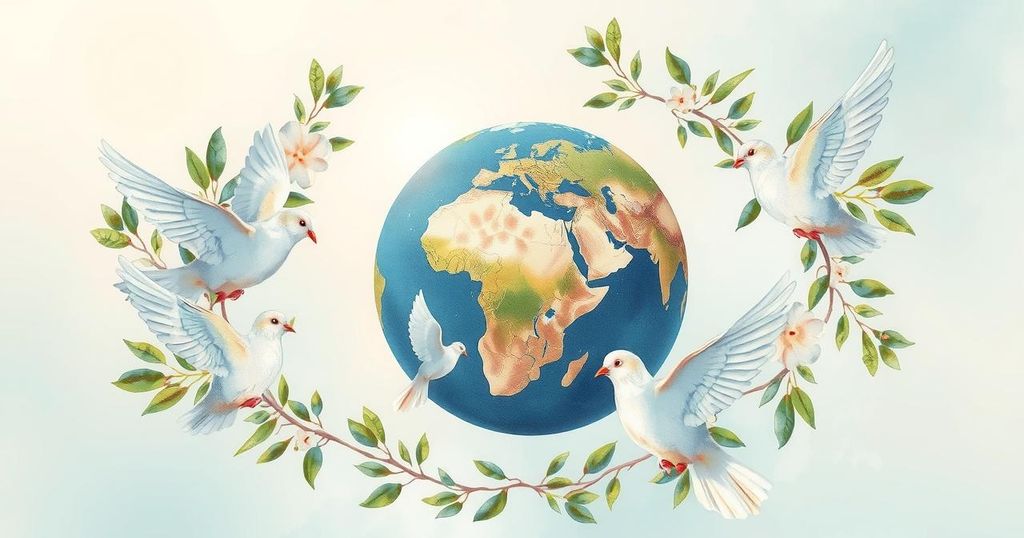Trump and Rubio Secure Peace Treaty While Pakistan Nominates Him for Nobel Prize
President Trump announced a peace treaty between Rwanda and Congo, while Pakistan nominated him for the 2026 Nobel Peace Prize for his diplomatic efforts. His comments about the nomination were laced with skepticism, as India denied claims of U.S. mediation in its conflict with Pakistan. The validity of his peace efforts is now under scrutiny as negotiations continue.
On Friday, President Donald Trump declared a diplomatic breakthrough, announcing he and Secretary of State Marco Rubio successfully brokered a peace treaty between Rwanda and Congo. In the midst of this progress, he also celebrated his formal nomination for the 2026 Nobel Peace Prize by Pakistan. This nomination comes in light of his efforts to foster peace amid longstanding regional tensions.
In a post on Truth Social, Trump expressed his enthusiasm for the treaty, which seeks to end years of violent conflict that has plagued both nations. He stated, “I have arranged, along with Secretary of State Marco Rubio, a wonderful Treaty between the Democratic Republic of the Congo, and the Republic of Rwanda… which has gone on for decades.” He noted that representatives from both countries will sign the agreement in Washington on Monday.
Trump, reflecting on the Nobel Peace Prize nomination, indicated a level of skepticism about his own candidacy. He articulated, “This is a Great Day for Africa and, quite frankly, a Great Day for the World. I won’t get a Nobel Peace Prize for this… but the people know, and that’s all that matters to me!” His remarks highlighted his involvement in other international disputes, which he feels have not garnered recognition.
In an interesting turn of events, Indian officials quickly pushed back against Trump’s assertion that he had played a key role in halting conflict between India and Pakistan. Indian Foreign Secretary Vikram Misri emphasized that ceasefire discussions were carried out directly between India and Pakistan, without U.S. mediation, leading to further clarification on the matter from Indian Prime Minister Narendra Modi, who reinforced India’s historical stance against foreign intervention.
The Nobel nomination from Pakistan was made public just hours after Trump’s announcement. It recognized Trump’s diplomatic efforts during the latest India-Pakistan crisis, highlighting that Pakistan views his leadership as a vital factor in achieving regional stability. The official statement from Pakistan commended “his decisive diplomatic intervention and pivotal leadership,” asserting that Trump exemplified “robust diplomatic engagement” and acknowledged his contributions toward resolving disputes.
Amidst heightened tensions in South Asia, Trump’s actions have been framed by Pakistani leaders as evidence of his role as a committed peacemaker. They noted, “This intervention stands as a testament to… conflict resolution through dialogue.” Furthermore, they looked forward to Trump’s potential to help with enduring conflicts, such as the longstanding issue of Jammu and Kashmir.
However, the timeline for the Nobel nomination process is strict; nominations are confidential and need to be submitted by January 31. Individuals and organizations eligible to nominate include national governments and previous laureates, according to The Nobel Prize’s official guidelines.
In summary, President Trump’s announcement regarding a peace treaty between Rwanda and Congo reflects his continued engagement in international diplomacy. The nomination for the Nobel Peace Prize by Pakistan adds a complex layer to his narrative of peace efforts, despite pushback from India concerning his involvement in regional conflicts. While the intricacies of these global interactions are ongoing, the focus now shifts to the signing ceremony and the path forward for regional stability.
Original Source: www.foxnews.com




Post Comment